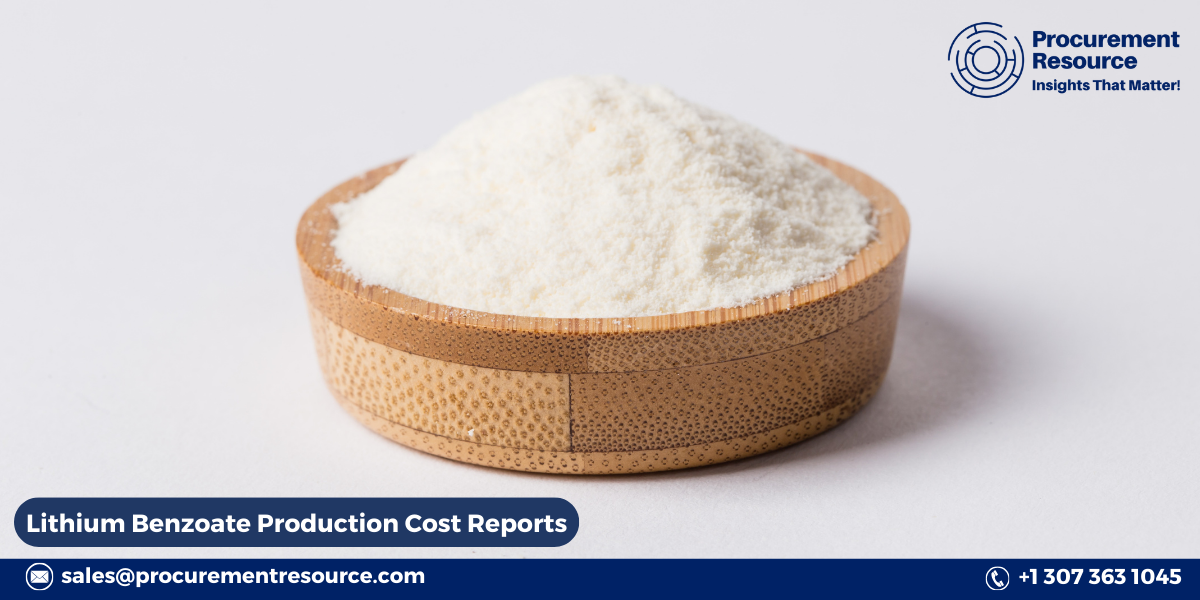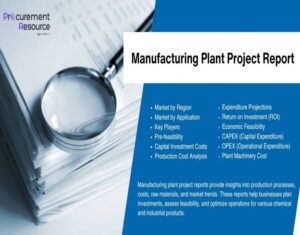
Lithium benzoate, a lithium salt of benzoic acid, is used in various industrial and pharmaceutical applications. With the rising demand for specialized lithium compounds, understanding the production process of lithium benzoate has become increasingly essential. This report will cover the production process, applications, raw material requirements, cost factors, and more.
What is Lithium Benzoate? Lithium benzoate is a white crystalline powder with the chemical formula C₇H₅LiO₂ and a molar mass of 128.05 g/mol. It’s commonly used in the synthesis of pharmaceutical agents, as a corrosion inhibitor, and in various industrial applications.
Production Process of Lithium Benzoate
The production of lithium benzoate involves the reaction of lithium hydroxide or lithium carbonate with benzoic acid. Here’s a step-by-step breakdown of the process:
- Raw Material Preparation:
- Lithium Source: Lithium hydroxide (LiOH) or lithium carbonate (Li₂CO₃).
- Benzoic Acid: A key reagent, usually obtained from the oxidation of toluene or benzene.
- Reaction Process:
- In a reaction vessel, benzoic acid is combined with either lithium hydroxide or lithium carbonate.
- The mixture is heated, allowing for the formation of lithium benzoate and water (if using lithium hydroxide) or carbon dioxide (if using lithium carbonate).
- Filtration and Purification:
- The reaction mixture is then filtered to remove any impurities.
- Crude lithium benzoate is washed with water and dried to obtain a pure crystalline form.
- Drying and Packaging:
- After filtration, the product is carefully dried to eliminate moisture.
- The final product is packaged and stored under controlled conditions to prevent degradation.
Applications of Lithium Benzoate
Lithium benzoate finds its utility across a range of sectors due to its versatility and effectiveness:
- Pharmaceuticals: Used as an intermediate in drug synthesis, particularly in the production of medications that target inflammation and bacterial infections.
- Corrosion Inhibitor: In industries requiring corrosion protection, lithium benzoate serves as an effective inhibitor, particularly in metal processing.
- Specialty Chemicals: Lithium benzoate is often utilized in the formulation of greases, as it enhances the performance of the end product by increasing lubrication and stability.
Raw Material Requirements
- Lithium Source:
- Lithium hydroxide or lithium carbonate, both of which are widely used in lithium compound production.
- Benzoic Acid:
- A readily available organic acid derived from petroleum-based chemicals or natural sources.
Cost Factors in Lithium Benzoate Production
Several cost factors influence the production of lithium benzoate, impacting the final pricing structure:
- Raw Material Costs: Prices of lithium compounds and benzoic acid can fluctuate based on market conditions.
- Energy Costs: The production process, particularly the heating stage, requires substantial energy.
- Labor and Equipment: Skilled labor and specialized equipment are essential for ensuring quality and maintaining safety standards.
- Purification and Packaging: Proper purification processes and packaging contribute to the final cost, ensuring product stability and longevity.
Safety and Environmental Considerations
During production, it’s essential to maintain strict safety protocols to avoid exposure to reactive chemicals and potential health hazards. Additionally, the disposal of by-products, especially when lithium carbonate is used, must follow environmental regulations to minimize ecological impact.
Future Market Outlook
With the continued expansion of the pharmaceutical and industrial sectors, the demand for lithium benzoate is likely to grow. Innovations in production methods, along with increased research into lithium-based compounds, suggest a promising future for the market.
The production of lithium benzoate is a multifaceted process involving precise chemical reactions, specialized raw materials, and strict safety protocols. As the demand for lithium compounds increases, understanding the production and application of lithium benzoate is crucial for industries looking to leverage its benefits.
By streamlining the production process and exploring sustainable practices, manufacturers can not only meet market demand but also contribute to the broader adoption of lithium-based solutions in various applications.
Contact Us:
Company Name: Procurement Resource
Contact Person: Endru Smith
Email: sales@procurementresource.com
Toll-Free Number: USA & Canada - Phone no: +1 307 363 1045 | UK - Phone no: +44 7537 132103 | Asia-Pacific (APAC) - Phone no: +91 1203185500
Address: 30 North Gould Street, Sheridan, WY 82801, USA






